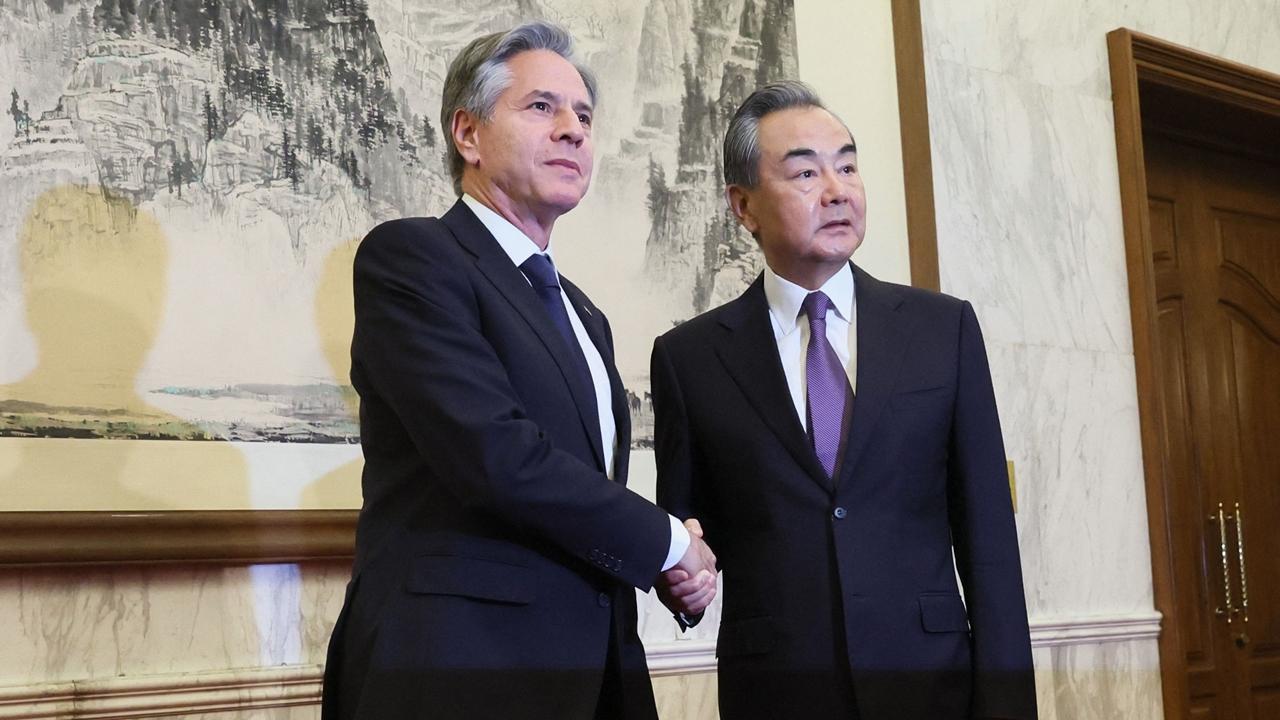Blinken was meeting Monday morning with China's top diplomat Wang Yi and an encounter with President Xi Jinping was still in the cards before he departs in the late evening

US Secretary of State Antony Blinken (L) shakes hands with China's Director of the Office of the Central Foreign Affairs Commission Wang Yi at the Diaoyutai State Guesthouse in Beijing on June 19. Pic/AFP
US Secretary of State Antony Blinken has opened a second and final day of critical meetings with senior Chinese officials as the two sides expressed willingness to talk but showed little inclination to bend on hardened positions that have sent tensions soaring, news agency AP reported.
ADVERTISEMENT
Blinken was meeting Monday morning with China's top diplomat Wang Yi and an encounter with President Xi Jinping was still in the cards before he departs in the late evening. Neither Blinken nor Wang made any comment to reporters as they greeted each other and sat for their discussion.
In the first round of talks on Sunday, Blinken met for nearly six hours with Chinese Foreign Minister Qin Gang after which both countries said they had agreed to continue high-level discussions. However, there was no sign that any of the most fractious issues between them were closer to resolution.
The two sides both said Qin had accepted an invitation from Blinken to visit Washington but Beijing made clear that "the China-U.S. relationship is at the lowest point since its establishment." That sentiment is widely shared by U.S. officials.
The State Department said Blinken had stressed "the importance of diplomacy and maintaining open channels of communication across the full range of issues to reduce the risk of misperception and miscalculation." The Chinese, meanwhile, restated their position that the current state of relations "does not serve the fundamental interests of the two peoples or meet the shared expectations of the international community," according to the foreign ministry.
Blinken is the highest-level American official to visit China since President Joe Biden took office and his two-day trip comes after his initial plans to travel to China were postponed in February after the shootdown of a Chinese surveillance balloon over the U.S. Despite Blinken's presence in China, he and other U.S. officials had played down the prospects for any significant breakthroughs on the most vexing issues facing the planet's two largest economies.
Still, his talks could pave the way for a meeting in the coming months between Biden and Xi. Biden said Saturday that he hoped to be able to meet with Xi in the coming months to take up the plethora of differences that divide them.
That long list incudes disagreements ranging from trade to Taiwan, human rights conditions in China and Hong Kong to Chinese military assertiveness in the South China Sea and Russia's war in Ukraine.
In his meetings on Sunday, Blinken also pressed the Chinese to release detained American citizens and to take steps to curb the production and export of fentanyl precursors that are fueling the opioid crisis in the United States. Blinken "made clear that the United States will always stand up for the interests and values of the American people and work with its allies and partners to advance our vision for a world that is free, open, and upholds the international rules-based order," the State Department said.
The Chinese foreign ministry countered in its statement that "China hopes that the U.S. will adopt an objective and rational perception of China, work with China in the same direction, uphold the political foundation of China-U.S. relations, and handle unexpected and sporadic events in a calm, professional and rational manner."
Blinken and other officials have emphasized the importance of the U.S. and China establishing and maintaining better lines of communication.
Biden and Xi had made commitments to improve communications "precisely so that we can make sure we are communicating as clearly as possible to avoid possible misunderstandings and miscommunications," Blinken said before leaving.
Xi offered a hint of a possible willingness to reduce tensions, saying in a meeting with Microsoft Corp. co-founder Bill Gates on Friday that the United States and China can cooperate to "benefit our two countries."
Since the cancellation of Blinken's trip in February, there have been some high-level engagements. CIA chief William Burns traveled to China in May, while China's commerce minister traveled to the U.S. And Biden's national security adviser Jake Sullivan met with senior Chinese foreign policy adviser Wang Yi in Vienna in May.
But those have been punctuated by bursts of angry rhetoric from both sides over the Taiwan Strait, their broader intentions in the Indo-Pacific, China's refusal to condemn Russia for its war against Ukraine, and U.S. allegations from Washington that Beijing is attempting to boost its worldwide surveillance capabilities, including in Cuba.
And, earlier this month, China's defense minister rebuffed a request from U.S. Defense Secretary Lloyd Austin for a meeting on the sidelines of a security symposium in Singapore, a sign of continuing discontent.
Meanwhile, the national security advisers of the United States, Japan and the Philippines held their first joint talks last week and agreed to strengthen their defense cooperation, in part to counter China's growing influence and ambitions.
This coincides with the Biden administration inking an agreement with Australia and Britain to provide the first with nuclear-powered submarines, with China moving rapidly to expand its diplomatic presence, especially in the Indian Ocean and the Pacific island nations, where it has opened or has plans to open at least five new embassies over the next year.
The agreement is part of an 18-month-old nuclear partnership given the acronym AUKUS for Australia, the United Kingdom and the United States.
(With inputs from AP)
 Subscribe today by clicking the link and stay updated with the latest news!" Click here!
Subscribe today by clicking the link and stay updated with the latest news!" Click here!







